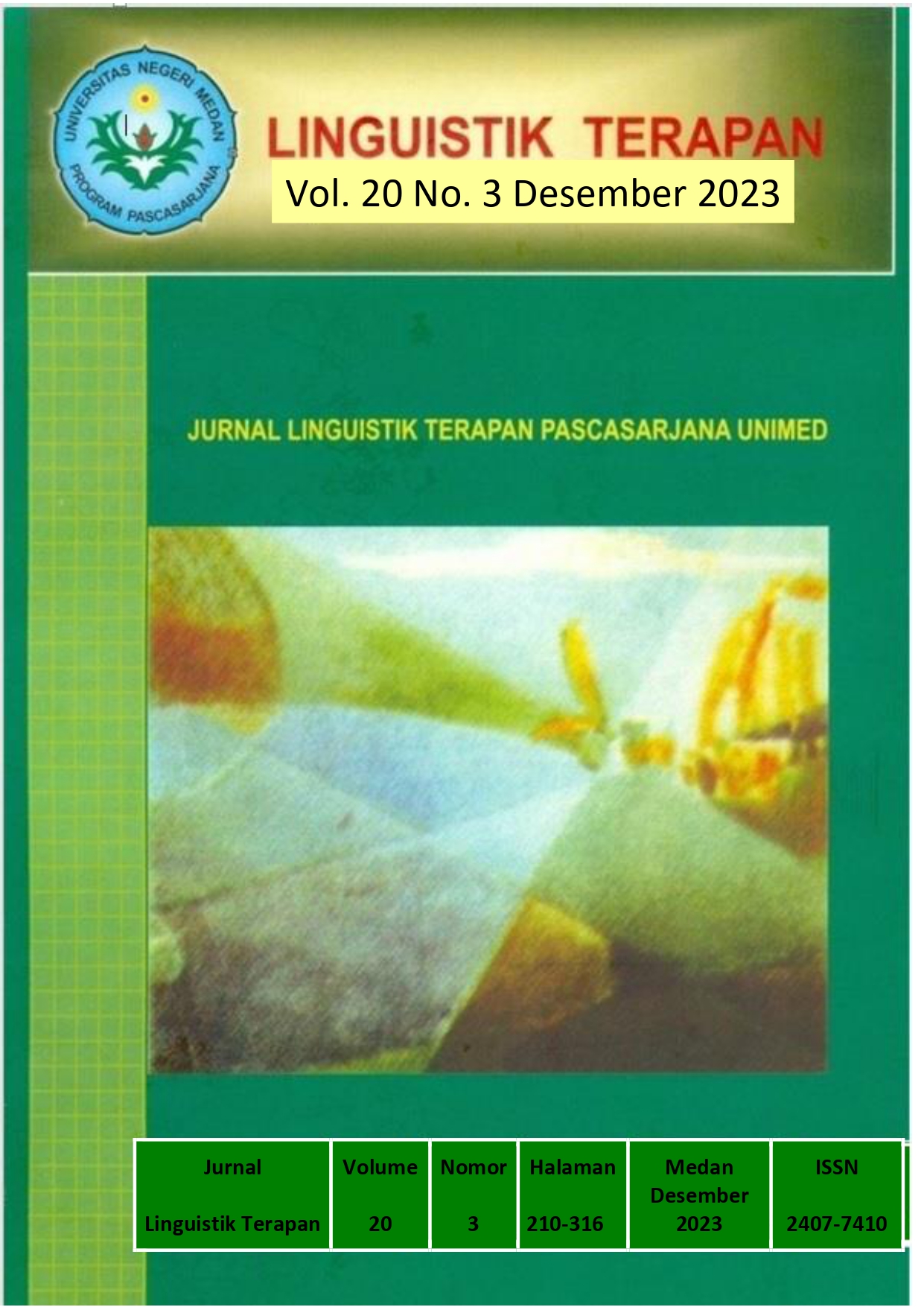SCALAR IMPLICATURE IN FACEBOOK
DOI:
https://doi.org/10.24114/lt.v20i3.58564Keywords:
Scalar Expression, Implicature, Facebook StatusAbstract
This research explores the phenomenon of scalar implicature in Facebook status updates, using Yule's systems theory to dissect the implied meanings conveyed through scalar expressions. The research reveals that scalar implicature significantly influences communication on Facebook, providing more insight into the construction of implicatures. Noteworthy findings include examples of scalar implicature in status updates featuring terms such as "some", "few", "more", "more", "many", "all", "most", and "none". This research aims to find out how these scalar terms are used by Facebook users to communicate nuanced messages behind the explicit substance of the status, underscore the importance of understanding the interaction between scalar terms, pragmatic elements, and semantic components for effective communication on platforms such as Facebook. Using a qualitative descriptive approach, the research examined data drawn from Facebook status updates to underscore the intricate relationship between scalar expressions and pragmatic and semantic elements in communication. The listening method combined with reading, selecting, and note-taking techniques produced the data. Statements, details, and proverbs that appear in the status updates of the author's Facebook page This study underscores how users use scalar terms to effectively communicate nuanced meanings and intentions on social media platforms such as Facebook. By emphasizing the importance of understanding scalar implicatures in achieving communication goals, this study highlights the use of language in everyday online interactions. The implications of this study extend to a broader understanding of language use in social media settings, emphasizing the critical role of scalar implicatures in facilitating effective communication.References
Grice, H. Paul. (1975). Logic and Conversation. In Peter Cole and Jerry Morgan, eds. Syntax and Semantics, Volume 3: Speech Acts, 43“58. New York: Academic Press.
Horn, Laurence R. (1972). On the Semantic Properties of Logical Operators in English. Ph.D. Thesis, UCLA, Los Angeles.
Kratzer, Angelika. (2003). Scalar Implicatures: Are There Any? Workshop on Polarity, Scalar Phenomena, and Implicatures. University of Milan-Bicocca.
Levinson, S.C. (1983). Pragmatics. Cambridge: Cambridge University Press.
Mifah, M. (2019). Effective Communication Strategy in Learning.
Mailani, O., Nuraeni, I., Syakila, SA, & Blueardi, J. (2022). Language as a Means of Communication in Social Life. Communication Journal, 2.
Noveck, I. and Sperber, D. (2007). The Why and How of Experimental Pragmatics: The Case of ˜Scalar Inferences™. In N. Burton-Roberts (ed.). Pragmatics. Palgrave Macmillan, pp. 184“212.
Nunberg, G. D. (1978). The Pragmatics of Reference. Bloomington, In: Indiana University Linguistics Club.
Pouscoulous, N. (2006). Processing Scalar Inferences. Doctoral Dissertation, EHESS, Paris.
Prastowo, Andi. Metode Penelitian Kualitatif. (2011). Jakarta: Ar-Ruzz Media.
Putri, U.P (2021). Kajian Linguistik Forensik dalam Media Sosial Facebook Studi Kasus Pada Komentar Postingan Terkait Kasus N.S. Gambus. um-palembang.ac.id.
Recanati, F. (2003). Embedded Implicatures. Philosophical Perspectives, 17, 299“332.
Robyn Carston (1998). "Informativeness, Relevance and Scalar Implicature". University College London.
Sanjaya, Wina. (2018). Penelitian Pendidikan Jenis, Metode dan Prosedural. Jakarta: Prenada Media Group.
Susmita, Dita Ayu; Asrina Hasibuan, Suhairi. (2022). Make Effective Communication in Business Economics and Social Life. Journal of Communication and Islamic Broadcasting, 22. Doi:10.47476.
Yule, G. (1996). Pragmatics. USA: Oxford University Press. Lyotard, J.F.(1982). The Postmodern Condition: A Report of Knowladge. Manchester: University of Menchester. hlm.xi.
Sauerland, U. (2004). Scalar Implicatures in Complex Sentences. Linguistics and Philosophy, 27, 367“391.
Spector, B. (2006). Aspects de La Pragmatique Des Opérateurs Logiques. Doctoral Dissertation, University of Paris VII
Downloads
Published
How to Cite
Issue
Section
License
Copyright (c) 2024 Feronika Lakamau

This work is licensed under a Creative Commons Attribution-ShareAlike 4.0 International License.






